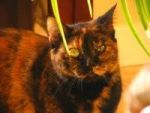| | | | |
13 April 2010 18:01 | | | Bonjour Eric!  Y a t'il une majuscule à "Green-wood"? En effectuant une recherche, je suis tombé sur ce lien :
http://fr.wikipedia.org/wiki/Cimeti%C3%A8re_de_Green-Wood
Edit : En consultant le lien français, j'ai constaté que n'importe qui pouvait s'amuser à saboter le travail des wikipédistes, car sur la version française de ce lien sur Green-Wood cemetery, on peut lire, à la première ligne :
"Le cimetière de Green-Wood (Green-Wood Cemetery) est un cimetière de la ville de New York situé dans l'ouest de Ploërmel.....
Rien n'arrête l'imbécilité, surtout pas sur internet! 
| | |
13 April 2010 17:37 | | | Title: The Mad Mother
Author: William Wordsworth
Her eyes are wild, her head is bare,
The sun has burnt her coal-black hair,
Her eye-brows have a rusty stain,
And she came far from over the main.
She has a baby on her arm,
Or else she were alone;
And underneath the hay-stack warm,
And on the green-wood stone,
She talked and sung the woods among;
And it was in the English tongue.
"Sweet babe! they say that I am mad,
But nay, my heart is far too glad;
And I am happy when I sing
Full many a sad and doleful thing:
Then, lovely baby, do not fear!
I pray thee have no fear of me,
But, safe as in a cradle, here
My lovely baby! thou shalt be,
To thee I know too much I owe;
I cannot work thee any woe."
A fire was once within my brain;
And in my head a dull, dull pain;
And fiendish faces one, two, three,
Hung at my breasts, and pulled at me.
But then there came a sight of joy;
It came at once to do me good;
I waked, and saw my little boy,
My little boy of flesh and blood;
Oh joy for me that sight to see!
For he was here, and only he.
Suck, little babe, oh suck again!
It cools my blood; it cools my brain;
Thy lips I feel them, baby! they
Draw from my heart the pain away.
Oh! press me with thy little hand;
It loosens something at my chest;
About that tight and deadly band
I feel thy little fingers press'd.
The breeze I see is in the tree;
It comes to cool my babe and me.
Oh! love me, love me, little boy!
Thou art thy mother's only joy;
And do not dread the waves below,
When o'er the sea-rock's edge we go;
The high crag cannot work me harm,
Nor leaping torrents when they howl;
The babe I carry on my arm,
He saves for me my precious soul;
Then happy lie, for blest am I;
Without me my sweet babe would die.
Then do not fear, my boy! for thee
Bold as a lion I will be;
And I will always be thy guide,
Through hollow snows and rivers wide.
I'll build an Indian bower; I know
The leaves that make the softest bed:
And if from me thou wilt not go.
But still be true 'till I am dead,
My pretty thing! then thou shalt sing,
As merry as the birds in spring.
Thy father cares not for my breast,
'Tis thine, sweet baby, there to rest:
'Tis all thine own! and if its hue
Be changed, that was so fair to view,
'Tis fair enough for thee, my dove!
My beauty, little child, is flown;
But thou will live with me in love,
And what if my poor cheek be brown?
'Tis well for me, thou canst not see
How pale and wan it else would be.
Dread not their taunts, my little life!
I am thy father's wedded wife;
And underneath the spreading tree
We two will live in honesty.
If his sweet boy he could forsake,
With me he never would have stay'd:
From him no harm my babe can take,
But he, poor man! is wretched made,
And every day we two will pray
For him that's gone and far away.
I'll teach my boy the sweetest things;
I'll teach him how the owlet sings.
My little babe! thy lips are still,
And thou hast almost suck'd thy fill.
--Where art thou gone my own dear child?
What wicked looks are those I see?
Alas! alas! that look so wild,
It never, never came from me:
If thou art mad, my pretty lad,
Then I must be for ever sad.
Oh! smile on me, my little lamb!
For I thy own dear mother am.
My love for thee has well been tried:
I've sought thy father far and wide.
I know the poisons of the shade,
I know the earth-nuts fit for food;
Then, pretty dear, be not afraid;
We'll find thy father in the wood.
Now laugh and be gay, to the woods away!
And there, my babe; we'll live for aye.
| | |
13 April 2010 18:33 | | | Bonjour, Francky, et merci...
Non, il n'y pas de majuscule à "green-wood", ce qui aurait simplifié les choses !
Wordsworth, qui a voyagé en France (ce me semble), serait-il passé à Ploërmel  !! | | |
14 April 2010 06:57 | | | | | |
14 April 2010 07:06 | | 
gamine Number of messages: 4611 | Est-ce que cela ne peut pas être une pierre couverte de mousse par le temps?   | | |
14 April 2010 07:45 | | | Oui, ça se pourrait... J'avais du mal à associer végétal et minéral dans cette expression, mais oui, pourquoi pas...
Merci ! |
|

